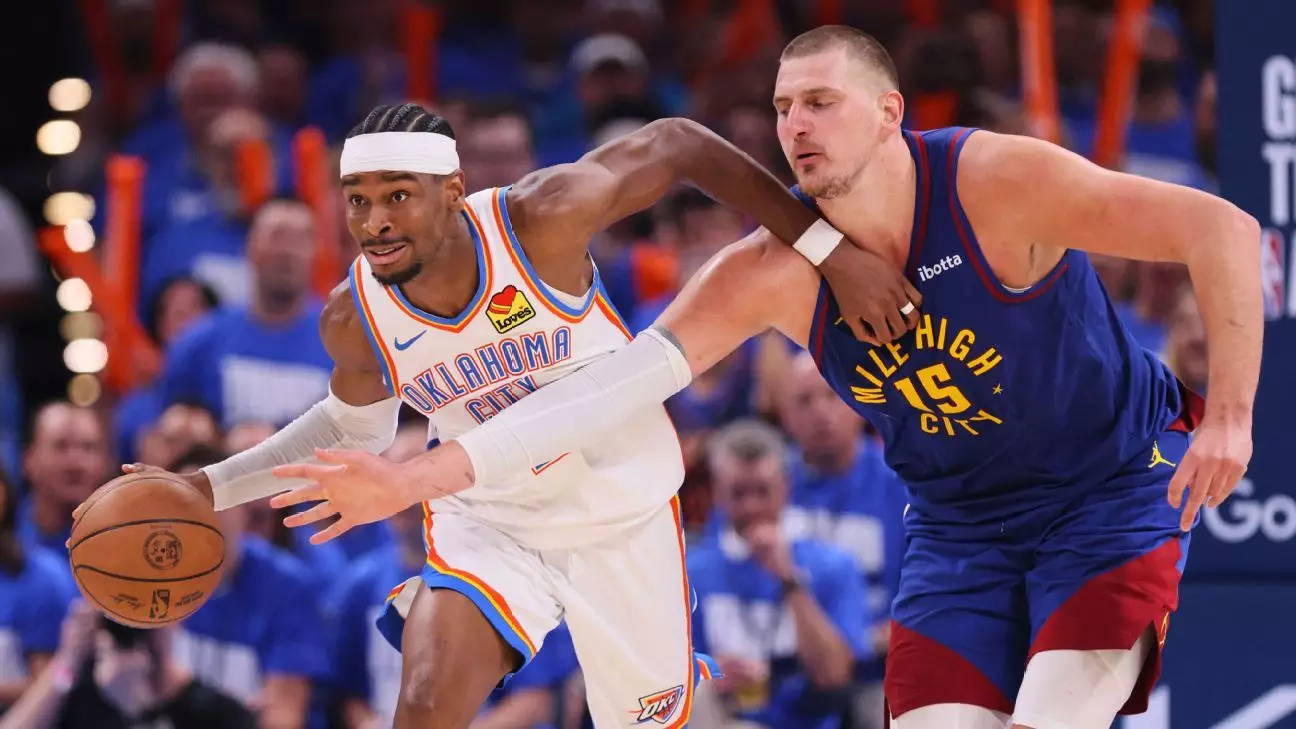As the curtains closed on another intense NBA season, few stories resonated more than the ascent of Shai Gilgeous-Alexander. The Oklahoma City Thunder guard not only claimed the MVP award, a testament to his electrifying performance throughout the season, but also solidified his status among the elite by making the All-NBA first team for the third consecutive time. This remarkable achievement underscores his transformation from a promising young talent to a cornerstone player in the league, guiding the Thunder into the Western Conference finals. With a 2-0 lead over the Minnesota Timberwolves, the excitement surrounding his potential contributions in the postseason is palpable.
Gilgeous-Alexander’s journey is emblematic of the evolution of player dynamics in the NBA. Once overshadowed by more prominent stars, he has harnessed his skills to redefine his role and has become the linchpin of Oklahoma City’s strategy. Recognized not only for his scoring ability but also for his defensive prowess and playmaking skills, he exemplifies the modern guard’s versatility, making him a pivotal player to watch as his career continues to unfold.
Elite Company: The All-NBA First Team
Joining Gilgeous-Alexander on the All-NBA first team are five colossal figures in the sport: Nikola Jokic, Giannis Antetokounmpo, Jayson Tatum, and Donovan Mitchell. Each of these players has carved out a profound legacy, further emphasizing just how competitive the league has become. Jokic, the Denver Nuggets center, remains a formidable presence, with this being his seventh All-NBA selection and a remarkable testament to his consistent excellence, especially after claiming the MVP runner-up position once again.
Antetokounmpo, known widely for his explosive athleticism and basketball IQ, continues to be an embodiment of what it means to be a franchise player. His seven consecutive first-team selections mirror his relentless drive and adaptability on the court. Meanwhile, Tatum and Mitchell represent a younger generation of talent that’s rapidly asserting its dominance. While Tatum solidifies his role as a premier scorer, Mitchell’s performance has helped elevate the Cleveland Cavaliers to new heights, marking his impactful presence in the NBA landscape.
The Significance of Second and Third Teams
The All-NBA second team featured a blend of experience and emerging talent. With LeBron James leading the charge, this year’s selection solidifies his legacy as one of the league’s all-time greats. No player has been chosen so many times, and his exceptional understanding of the game remains unmatched even at this stage of his career. Stephen Curry’s prowess continues to place him among the elite, while Anthony Edwards and Jalen Brunson are proving that they’re ready to step up when needed the most.
The third team introduces fresh names like Jalen Williams from the Thunder and Cade Cunningham of the Pistons, both of whom have shown glimpses of their vast potential. Their recognition within this list presents an exciting future for their franchises, especially as they navigate the next seasons with valuable experience under their belts. James Harden’s presence on the third team, after a brief hiatus from elite selections, signals that his contributions remain significant, retaining a key role in the evolving narrative of league dynamics.
Implications of All-NBA Selections
The implications of these awards extend beyond mere accolades. Players like Evan Mobley, who earned his first All-NBA selection alongside the Defensive Player of the Year title, can negotiate contracts that reflect their newly minted status among basketball’s best. For him, this recognition translates into a potential financial boon, setting the stage for contracts that not only reward individual efforts but also reshape the team’s financial strategy moving forward.
In a league where contractual negotiations are influenced heavily by honors and selections, the All-NBA designations serve as leverage for players to secure greater financial terms and stability. Similarly, awards like the Most Improved Player and Coach of the Year highlight the league’s ever-changing landscape, revealing the emerging talents that are paving their way to the top and challenging the traditional hierarchy of star players.
In essence, the 2023 NBA end-of-season awards encapsulate not just individual achievements but the shifting expectations and rising talents that keep the league dynamic and engaging. It provides insight into who will lead the charge through the playoffs and potentially into the following seasons, making it clear that the future is as bright as its stars.


Leave a Reply